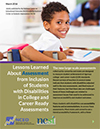 Recent surveys of teachers found that students with disabilities like many of the features of the new college- and career-ready (CCR) assessments that were recently rolled out by states and consortia. Still, teachers identified assessment challenges that need to be addressed to improve student outcomes.
Recent surveys of teachers found that students with disabilities like many of the features of the new college- and career-ready (CCR) assessments that were recently rolled out by states and consortia. Still, teachers identified assessment challenges that need to be addressed to improve student outcomes.
To address these challenges NCEO and the National Center on Systemic Improvement recently co-published a Brief on Lessons Learned About Assessment from Inclusion of Students with Disabilities in College and Career Ready Assessments. The Brief was prepared to provide information and suggestions for state education agencies (SEAs) and other technical assistance (TA) providers. Easy-to-use tables identify the challenges, implications for assessment, and implications for TA providers. It also includes an extensive list of suggested resources.
Three assessment challenges identified by teachers were:
Unfamiliarity with Item Types: Students struggled with some of the item types because they had never experienced them.
Accessibility Challenges: Some students found it difficult to meaningfully engage with the new assessments because they did not receive needed accessibility features and accommodations.
Technical Challenges: Problems with the testing system, as well as issues with how the testing system interacted with assistive technology (AT) devices, made it difficult for some students to access the test.
Members of NCEO’s Inclusive Assessment Community of Practice (CoP) made important contributions to this Brief. They provided information about the issues and implications. The CoP members also reviewed drafts of this Brief.
This Brief is a companion to a previously published report that addressed instructional issues. The companion Brief is titled, Lessons Learned About Instruction from Inclusion of Students with Disabilities in College and Career Ready Assessments.
